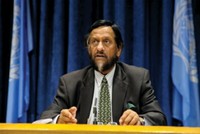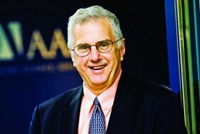Advertisement
Grab your lab coat. Let's get started
Welcome!
Welcome!
Create an account below to get 6 C&EN articles per month, receive newsletters and more - all free.
It seems this is your first time logging in online. Please enter the following information to continue.
As an ACS member you automatically get access to this site. All we need is few more details to create your reading experience.
Not you? Sign in with a different account.
Not you? Sign in with a different account.
ERROR 1
ERROR 1
ERROR 2
ERROR 2
ERROR 2
ERROR 2
ERROR 2
Password and Confirm password must match.
If you have an ACS member number, please enter it here so we can link this account to your membership. (optional)
ERROR 2
ACS values your privacy. By submitting your information, you are gaining access to C&EN and subscribing to our weekly newsletter. We use the information you provide to make your reading experience better, and we will never sell your data to third party members.
Policy
Climate-Change Panel Under Scrutiny
Inquiry: Science academies will assess UN's prestigious body
by Cheryl Hogue
March 15, 2010
| A version of this story appeared in
Volume 88, Issue 11
A global coalition of national science academies will review how the Intergovernmental Panel on Climate Change (IPCC) operates, United Nations Secretary General Ban Ki-moon announced last week.
The InterAcademy Council will convene the review panel, which will operate “completely independently of the UN,” Ban said. The details given by Ban flesh out a late-February UN announcement that a probe of IPCC activities would take place (C&EN, March 8, page 8).
Science academies from around the world created the InterAcademy Council in 2000 to provide high-quality peer-reviewed advice to international organizations such as the World Bank and the UN. Its board consists of the presidents of national science academies from 15 countries, including the U.S.
IPCC, which shared the Nobel Peace Prize in 2007 for its assessments of climate-change science, has faced a rising tide of criticism in recent months about its scientific integrity. Controversy continues to swirl around e-mails, originally circulated among prominent scientists who serve on IPCC, that were stolen and posted on a website late last year. And in January, the panel acknowledged that a prediction in its 2007 report that Himalayan glaciers would melt away by 2035 was wrong.
Standing beside Ban as the secretary general announced the review, IPCC Chairman Rajendra K. Pachauri defended the 2007 report, saying its major conclusions “are beyond any reasonable doubt.”
The InterAcademy Council review will not delve into IPCC’s past scientific conclusions, said Robbert Dijkgraaf, cochair of the council. Instead, it will offer recommendations for ensuring the quality of IPCC reports in the future, he told reporters.
The review will examine how IPCC handles the “full range” of scientific views on human-induced climate change, said Dijkgraaf, president of the Royal Netherlands Academy of Arts & Sciences. It will also probe IPCC’s guidelines on the types of scientific literature employed in its assessment, paying particular attention to the use of studies that have not been peer reviewed, he said. Also under examination will be IPCC procedures for correcting errors identified after its reports are completed.
The UN will pay for the inquiry, but reviewers will be under no obligation to any government, IPCC, or the UN, Dijkgraaf stressed. Reviewers will serve on a volunteer basis, having only their travel and meeting expenses paid for, he said.
Sen. James M. Inhofe (R-Okla.), one of 27 Republican senators who in December 2009 asked Ban to launch an independent investigation of IPCC, welcomed the probe. But Inhofe, an outspoken skeptic of human-induced climate change, said the review won’t go far enough because it won’t scrutinize the scientific data in past IPCC reports.
The reviewers have their work cut out for them: Their report is supposed to be finished by Aug. 31. Dijkgraaf pointed out that IPCC is already gearing up for its next major assessment, and the outcome of the council’s review is expected to influence that process.





Join the conversation
Contact the reporter
Submit a Letter to the Editor for publication
Engage with us on Twitter